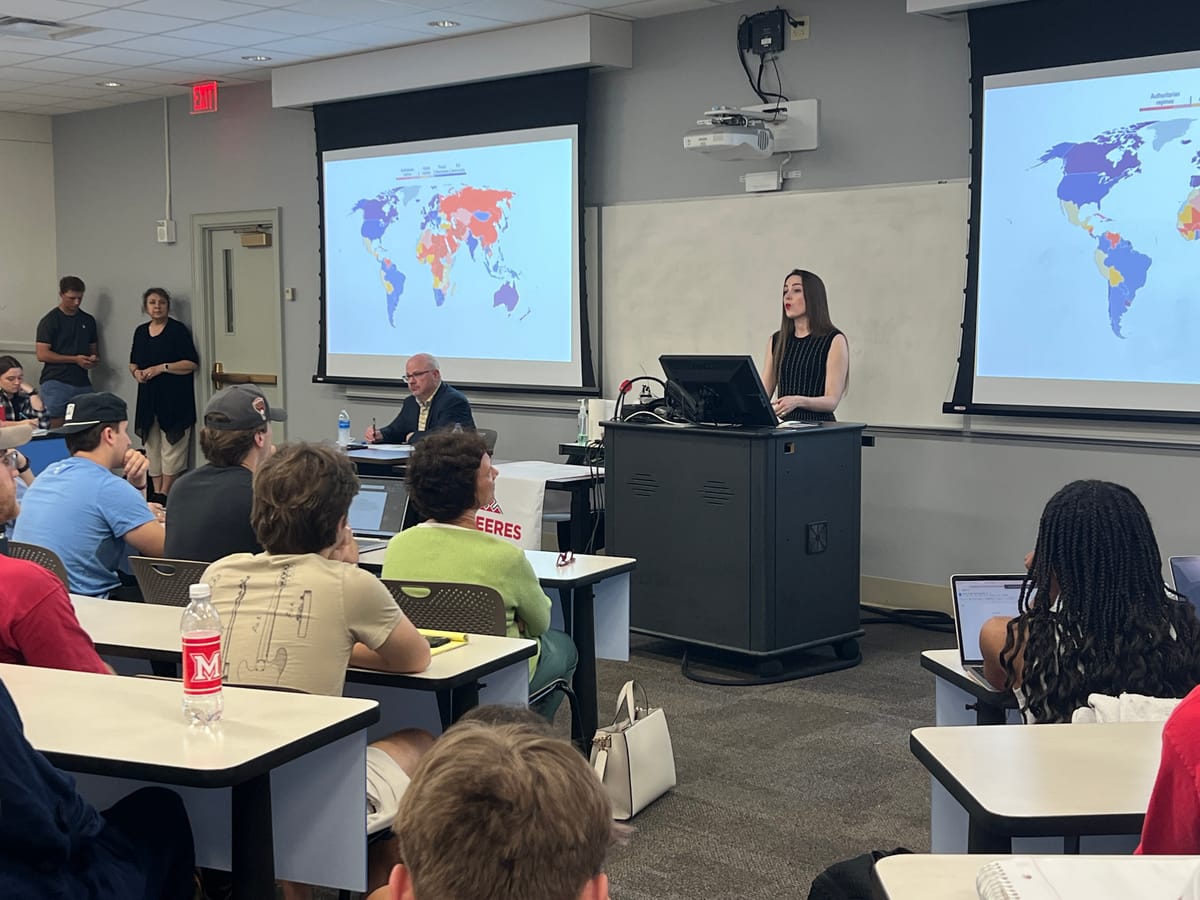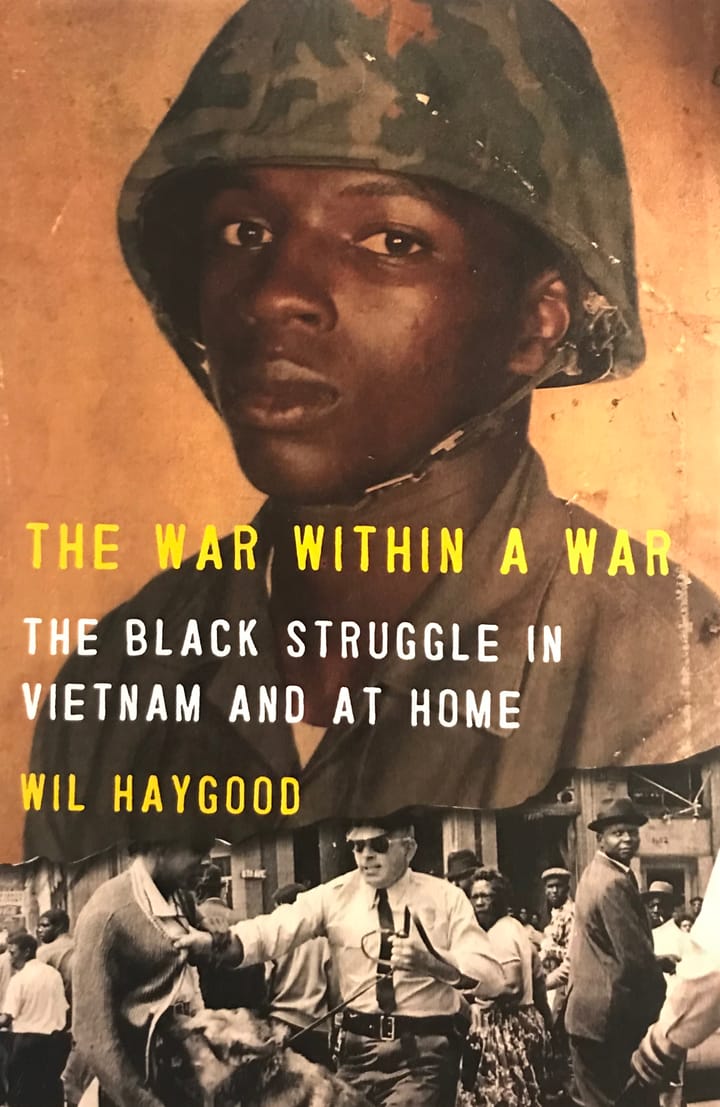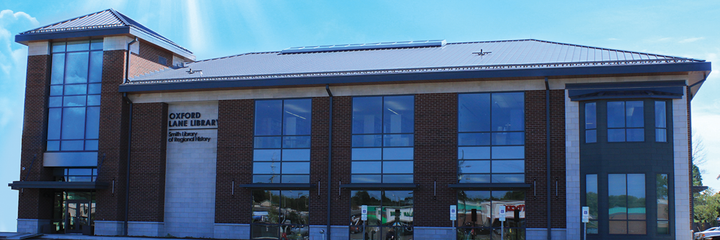Ukrainian Nobel Peace Laureate shares vision for end of war with Russia during Miami lecture
Ukrainian human rights lawyer Oleksandra Matviichuk's work with the Center for Civil Liberties earned the organization the Nobel Peace Prize in 2022. Last week, she shared her vision for a just peace in Ukraine during Miami University's annual Havighurst Lecture.

Oleksandra Matviichuk has spent the past three years documenting Russian war crimes in Ukraine.
The Ukrainian human rights lawyer and Chairwoman of the Center for Civil Liberties earned a Nobel Peace Prize for her organization in 2022 following Russia’s full-scale invasion of Ukraine. The Center was recognized for its Tribunal for Putin initiative, which has tracked details on more than 86,000 war crimes committed by Russia under Vladimir Putin.
On May 7, she shared her work and vision for post-war Ukraine with Miami University students during the annual Havighurst Lecture, hosted by the university’s Havighurst Center for European, Russian and Eurasian Studies. She told the packed room in Harrison Hall that the people of Ukraine deserve justice for Russia’s actions now, not at the eventual end of the war.
“The problem is, we still look at the war through the lens of the Nuremberg Trials,” Matviichuk told the packed room in Harrison Hall. “The Nazi criminals were tried only after the Nazi regime had collapsed … Justice shouldn’t be dependent on how and when the war ends, which means we cannot wait.”
Matviichuk is the first Ukrainian to give the Havighurst Lecture. Previous speakers have included dissidents, journalists and five heads of states, said Havighurst director Stephen Norris. She joins two other Nobel Peace Laureates — Mikhail Gorbachev and Dmitry Muratov — who have previously given the signature lecture.
The lecture came at a pivotal time for Ukraine, and in particular its relationship with the U.S. President Donald Trump previously vowed to end the war on day one back in office, but as it dragged on in the past four months, his administration has repeatedly shown openness to Russian demands like recognition of Crimea and other Ukrainian territories as part of Russia. This week, Trump called for a 30-day unconditional ceasefire, a strategy endorsed by Ukrainian President Volodymyr Zelensky, and threatened sanctions if it is not respected.
Matviichuk thanked attendees for the support U.S. citizens have shown for Ukraine in the past three years. While the war is being fought in Ukraine, it has global implications, she said, and leaders in former Soviet states widely believe that Putin will attack other countries if he is successful in Ukraine.
“We take oxygen, we take human rights, we take security for granted when we have them,” Matviichuk said, “and sometimes it’s too late to notice that it there was some alarm sign …In well developed democracies, I noted that people who started to take human rights for granted, who don’t understand their value, never pay blood for it. They can easily exchange their freedom for some success.”
Since the full-scale invasion, Matviichuk said more than 20,000 Ukrainian children have been separated from their families and deported to Russia, where many have been put up for adoption. Other illegally detained civilians have faced torture and sexual abuse. Discussions of the war need to include discussions of the human cost and not just territory, mineral deals or weapons agreements, she said.
In an interview with the Oxford Free Press, Matviichuk said she was inspired to become a human rights advocate as a child when she was first exposed to the Soviet dissident movement. She watched others stand up against persecution, family separation, forced psychological treatment and other human rights abuses and knew she wanted to join in the work against it.
“They had no other instruments how to fight for freedom and for human dignity, just their own words and their own position,” Matviichuk said. “From that time … I was, being a child, so inspired by this example that I decided myself to study law and to continue this fight for freedom and for human dignity.”
It’s a fight that has continued in Ukraine for centuries, Matviichuk said. Under the Soviet regime, Russian language and culture dominated, and political leaders made intentional efforts to suppress other cultural identities, often through violence and coercion.
Matviichuk’s life changed when Putin launched a full-scale invasion of Ukraine in February 2022, but the war truly started eight years earlier in February 2014 with the annexation of Crimea.
Despite eight years of annexation and Russian support for breakaway regions in Ukraine, international attention on the country’s struggles and individual identity was limited until the full-scale invasion. Matviichuk remembers that Ukrainian academics and advocates spent years asking the Metropolitan Museum of Art in New York City to change the name of a painting originally called “Russian Dancers.” To Russians and Ukrainians alike, she said, the work clearly depicted Ukrainian people, but the western world grew used to viewing all former Soviet states as extensions of Russia. It wasn’t until 2023 following the invasion that the museum changed its title to “Dancers in Ukrainian Dress.”
“I always joke that probably they think it’s still Russian dancers, but they wear Ukrainian clothes,” Matviichuk said. “This is an attitude which the West expresses not just for Ukrainians, but for other nations in our part of the globe.”
To date, the Tribunal for Putin has documented nearly 87,000 incidents it classifies as probable war crimes committed by Russia in Ukraine. Roughly 85% have been shelling, and the Center for Civil Liberties has identified more than 2,700 disappearances.




